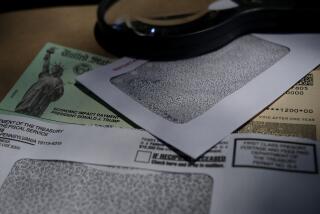Moody’s Not Impressed by Japan Package
- Share via
TOKYO — Japan’s economic planning chief promised that the $196-billion mother-of-all stimulus packages approved by the Cabinet on Monday will create a million new jobs and finally end Japan’s “vicious cycles of recession,” but Moody’s Investors Service wasn’t impressed.
Moody’s today took away Japan’s top “Aaa” credit rating, which the country had held for 17 years, because of “uncertainties and heightened risks over the long term arising from economic and policy weaknesses that have led to significant deterioration in the government’s fiscal position.” The country’s rating is now Aa1, considered “high quality.”
The larger-than-expected package of public works projects, tax cuts and loans was pushed through in time to show President Clinton, who arrives later this week for talks with Prime Minister Keizo Obuchi.
Persuading Japan’s leaders to jump-start their country’s economy is expected to be a central theme in the bilateral discussions, though U.S. officials say they will not make specific recommendations on how to accomplish the revival. This is Japan’s third supplementary budget and second stimulus package in six months.
Japanese government officials worked all weekend to boost the size of the package after markets showed disappointment in the plans for a smaller package leaked last week, government officials said. Late additions include the job-creation program and a proposed extension of jobless benefits.
But many observers remain skeptical that the package can provide enough fuel for the economy to meet the government’s new forecast of 0.3% growth for the fiscal year ending March 31. That forecast supersedes the 1.8% contraction that hed been envisioned without the latest stimulus package.
“More extraordinary macroeconomic and reform policies may be required for Japan to overcome its economic malaise,” Moody’s said.
Garry Evans, a strategist at HSBC Securities in Tokyo, expects that Japan’s economic output will still fall 1%. “But if they hadn’t done it, it would have been a complete downslide next year,” he said.
Reducing or eliminating Japan’s 5% consumption tax would have been more effective, he said.
But Taichi Sakaiya, director of the government’s Economic Planning Agency, ruled out a reduction. Raising the tax to 5% from 3% last year is widely blamed for sending the economy into recession.
Less than half the $196 billion involves actual tax cuts or spending, however. The rest is mainly loans or loan guarantees extended by government-affiliated agencies. Still, the expected supplementary budget of $48 billion is twice what had originally been contemplated.
“Since Japan has been taking too many painkillers, its tolerance level is becoming higher,” said Teizo Taya, senior economist at Daiwa Institute of Research in Tokyo. “Each time the package comes out, the dosage has to be larger, but the disease hasn’t been cured.”
Including the loans and guarantees, the government said it plans to spend $66 billion on public works in areas such as health and telecommunications, $8 billion for job creation and retraining, and $48 billion for loan guarantees to businesses having difficulty borrowing in the credit crunch. In addition, shopping vouchers worth about $180 apiece will be given to those under 15 and those over 65.
The package also has tax cuts previously outlined by Obuchi that slash top corporate rates from 50% to 40% and maximum individual rates from 65% to 50% of income.
Sakaiya promised this package is different from past measures that failed because they didn’t “try to break the cycles of recession.” Past packages included huge public works projects such as building roads and bridges in remote areas, which served to create only temporary construction jobs.
A key element in breaking the cycle is curing the credit crunch while priming demand, which will stimulate job growth, Sakaiya said.
With the plunge in real estate and stock market values in the ‘90s, Japan’s banks fell dangerously short on capital and cut back lending. Firms that couldn’t get loans reduced their investment and stopped hiring, leading to a recession.
It is difficult to determine how many of the projects the government plans will create huge numbers of jobs. Asked to detail specific projects, Sakaiya mentioned only a few, including installing toll-taking machines on highways and building a hub airport in the city of Nagoya.
However, many analysts believe deregulation of Japan’s economy is the best long-term answer to the country’s problems.
More to Read
Sign up for Essential California
The most important California stories and recommendations in your inbox every morning.
You may occasionally receive promotional content from the Los Angeles Times.













